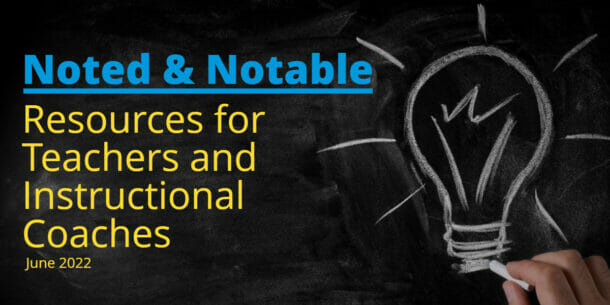Resources for Teachers and Instructional Coaches – June 2022

Schools are out and summer is here, but that doesn’t mean we’re not still learning!
This past month, we’ve been reading all about meetings: how to have better team meetings and what PLCs really are.
Here are our top picks for the June 2022 reads you shouldn’t miss. Read on for the highlights, article links, and related content.
Enhance the team collaboration in meetings
Increasingly, teachers are leading PD and team meetings. Having trouble making the most of that time?
This ASCD article talks about how to “kick-start a teamwork transformation.”
Here are 4 ways to get more out of team meetings:
- Embrace the Power of “We”. Berg suggests giving your team a nickname, a symbol, or a special handshake. This simple act can spur a sense of collective identity among members. Another way to deepen a team’s identity (if the team has been working collaboratively for some time) is to ask each member to identify a strength of each teammate.
- Limit Team Norms.
Coming to an agreement on team norms can play a powerful role in eliciting the perspectives needed for a group of educators to tackle hard problems.But proposing too many norms can backfire. In their July 2019 Educational Leadership article, Harvard professor Kathryn Parker Boudett and teacher leader Meghan Lockwood propose, as a general rule, limiting norms to 5-7 to make it easier to keep them front of mind.
- Cultivate a Culture of Co(n)frontation. To manage confrontation, leaders should strengthen the team’s skills for conflict resolution and negotiation. Encouraging mutual respect among faculty and modeling norms of communication will go a long way toward making co(n)frontation a team meeting asset.
- End Team-Building Sessions with Action Plans. Cultivating this planning process requires several steps. First, the actual team-building work must be connected to outcomes for the year ahead. Second, there must be a set schedule to ground the team’s development over time (newer teams may need more detailed schedules, while veteran teams can operate more loosely). Third, Ende writes, teams must move from talk to action and ensure that the process actually happens. Devote time throughout the year to accomplishing and sustaining the work.
Read the full post at ASCD: This Summer, Plan for Better Team Meetings
Thinking about how teacher collaboration can be enhanced? Check out how AI Coach by Edthena supports teachers’ teamwork with peers and coaches.
Professional learning communities
The term ‘PLC’ is thrown around when talking about teacher meetings but what are professional learning communities, really?
This article from the National Association of Secondary School Principals sets the record straight: “A PLC is not a meeting. It is the collaborative process used by teachers in a meeting. If you hear ‘we had our PLC,’ then you know there is a lack of understanding of what a PLC represents.”
Here’s a more clear-cut way to think about PLCs.
Schools and districts organize themselves into teams that share students or content. A team works interdependently to achieve a common goal for which all members are held mutually accountable. Teams can be formed by grade level, by course, by department, vertically across grade levels, or even electronically across districts to answer the four critical questions of learning in recurring cycles, unit by unit.
The critical questions addressed by a collaborative team include:
-
What should students know and be able to do?
-
How will we know that the students have learned the essential standards?
-
How will we respond when students do not learn?
-
How will we respond when students have already learned?
Read more about PLCs at NASSP: What’s a PLC Meeting, Anyway?
Using SMART goals to answer the questions above but want to try out a different goal-setting framework? Check out our guide to Jim Knight’s PEERS goals.
Missed last month’s edition of resources for teachers and coaches? Catch up on our May 2022 top resources for teachers and coaches!
